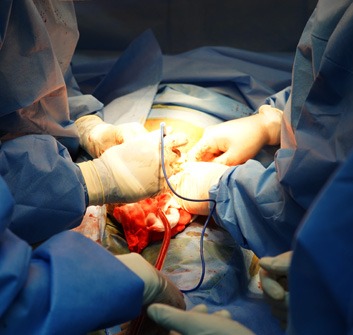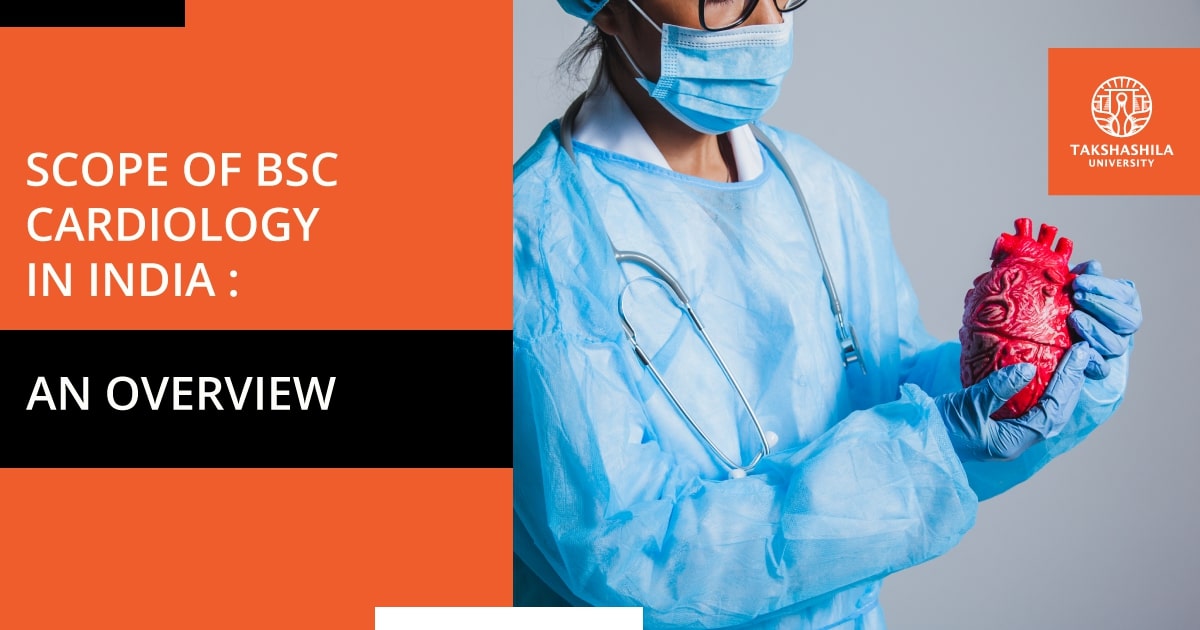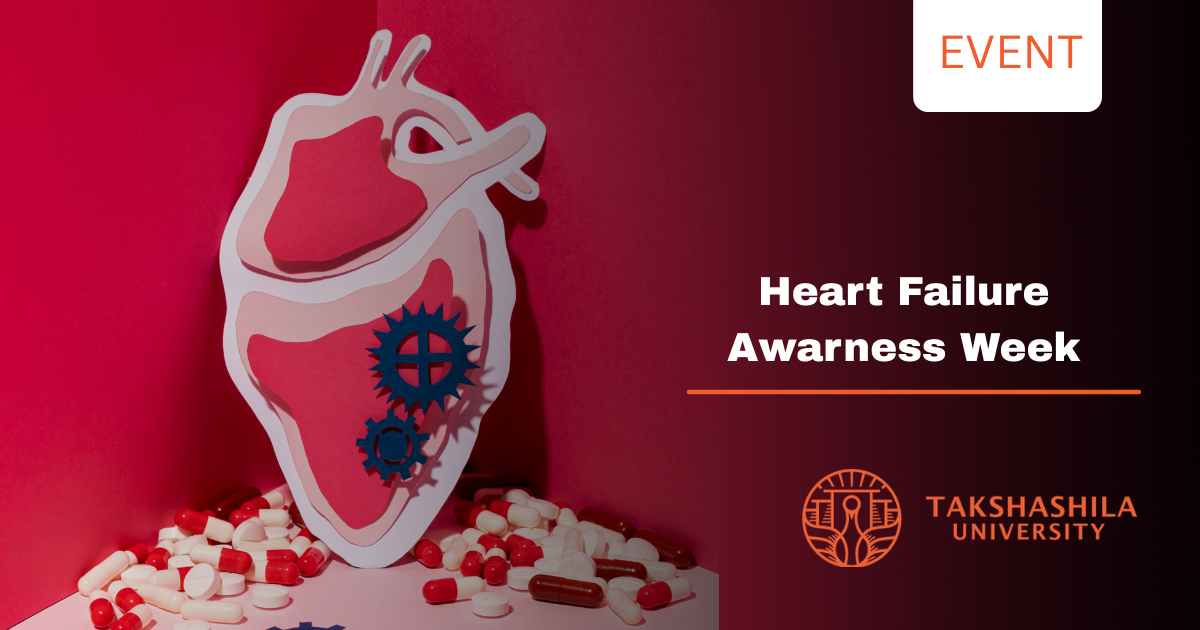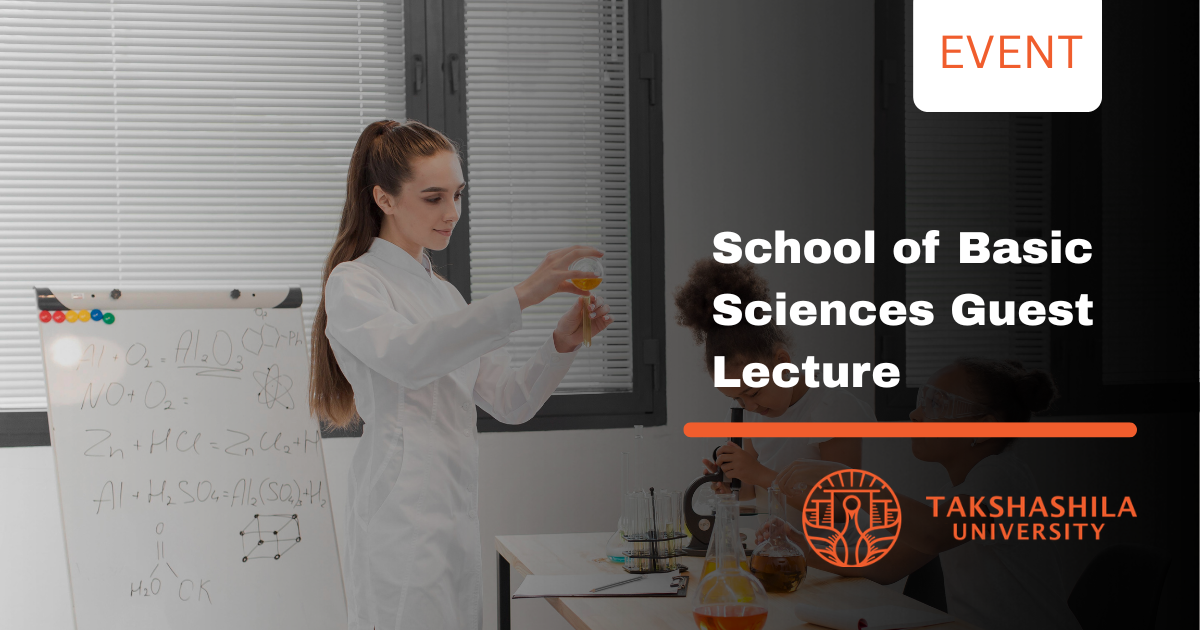Do you know that according to the World Health Organisation, more than 27% of deaths in India are due to Cardiovascular diseases? Yes, you heard it right!
The cardiovascular system, which includes the heart, blood vessels, and circulation, is essential for sustaining life. It works tirelessly to supply oxygen and nutrients to tissues and organs throughout the body. With rising levels of stress, sedentary lifestyles, and unhealthy diets, heart diseases are on the increase in India.
There is an emerging need for trained cardiology professionals who can screen, diagnose, and manage cardiovascular conditions to address this growing burden. The B.Sc. in Cardiology is an undergraduate program that aims to fulfil this need by producing skilled cardiac care professionals.
Cardiology is the branch of medicine that deals with heart disorders and the cardiovascular system. Let’s explore more to understand the scope of BSc cardiology in India. Ensure you read the blog till the end.

| Aspect | Details |
| Degree Name | B.Sc. Cardiology |
| Degree Type | Undergraduate |
| Duration | 3 years |
| Examination Type | Semester system with practical exams and assessments |
| Eligibility | 10+2 with Science (Biology group) |
| Admission Process | Entrance exams or merit-based admission |
| Course Fee | Varies according to the colleges; approximately ranges from INR 50,000 to INR 2 lakhs |
| Average Salary | INR 3 lakhs to 6 lakhs (on an entry-level basis) |
| Job Positions | Cardiovascular Technician, Echocardiographer, Cardiac Nurse, Clinical Research Associate, etc. |
| Other opportunities | Further specialisation, research, teaching, etc. |
| Top recruiting companies | Hospitals, Cardiac Care Centers, Diagnostic Labs |
What is B.Sc. Cardiology?
B.Sc. Cardiology is a specialised undergraduate course focusing on the cardiovascular system. Students learn about the structure and functioning of the heart, blood vessels, diagnostic tests, common heart diseases, and cardiologic treatment procedures.
The 3-year program exposes students to real-world clinical environments through practical classes and internships in affiliated hospitals and diagnostic centres.
The eligibility for this course is 10+2 or equivalent schooling with a minimum 50% score in Physics, Chemistry, and Biology.
The curriculum covers anatomy, physiology, pathology, and other subjects related to the heart and circulatory system. Recognised universities award the degree after completing the full-time course duration and clearing all exams.
Curriculum and Specialisations
The B.Sc. Cardiology curriculum provides comprehensive knowledge of cardiac sciences.
Core subjects include cardiac anatomy, physiology, biochemistry, pathology, radiology, critical care, clinical cardiology, cardiac medications, and surgery. Students also study allied subjects like anatomy, physiology, pathology, microbiology, forensic medicine, and computers.
Students can choose electives in specialisation areas, including non-invasive cardiology, invasive/interventional cardiology, pediatric cardiology, cardiac surgery, cardiac anaesthesia, cardiac rehabilitation, and cardiac imaging.
The wide range of subjects allows graduates to deliver skilled cardiology services in various healthcare settings.
Practical learning helps apply concepts to real clinical settings. Students get exposure to cardiac diagnostic modalities, intensive care equipment, and skills like monitoring vital parameters, administering medicines, and assisting doctors in medical procedures.
Career prospects after B.Sc. Cardiology
Armed with relevant clinical and technical skills, B.Sc. Cardiology graduates have rewarding career opportunities across healthcare sectors.
Hospitals:
Job roles like
- Cardiac Technicians,
- ICU Technicians,
- Cardiac Rehabilitation Assistants,
- Research Assistants, etc.
These roles contribute significantly to diagnosing, treating, and preventing heart diseases.
Diagnostic Labs and Centers:
Positions as
- ECG Technicians,
- Treadmill Test Technicians,
- Echocardiography Technicians, etc.
Pharmaceutical Companies: Medical Sales Representatives promoting cardiac medications and devices.
Graduates can find roles in cath labs, emergency departments, echocardiography units, and medical sales.
Apart from these, B.Sc. Cardiology professionals can also find employment in
- Emergency medical services,
- Blood banks,
- Academic institutions.
Potential job roles for B.Sc. graduates and approximate salary in India.
- Cardiac Technician- Rs 15,000-25,000
- ECG Technician- Rs 12,000-20,000
- Treadmill Test Technician- Rs 12,000-18,000
- Echocardiography Technician- Rs 15,000-25,000
- Cardiac Care Assistant- Rs 10,000-15,000
- Medical Representative- Rs 15,000-30,000
- Clinical Research Coordinator- Rs 15,000-25,000
- Cardiac Lab Technician- Rs 12,000-20,000
- Cardiac Monitor Technician- Rs 12,000-18,000
- Cardiac Cath Lab Assistant- Rs 15,000-25,000
(Disclaimer: The salary above is an approximate payscale for freshers, subject to change)
Scope for Higher Studies
For those interested in further specialisation, B.Sc. Cardiology opens doors to higher education programs.
Options include
- MD (Doctor of Medicine),
- MS (Master of Surgery),
- MSc (Master of Science), and
- Super specialisation fellowships in Cardiology
- PhD (Doctorate)
The further specialisation provides avenues in teaching, research, and advanced clinical practice, opening doors to advanced career opportunities.
Skills gained by B.Sc. Cardiology
In addition to in-depth medical knowledge, the course equips students with valuable technical, clinical, and soft skills.
- In-depth domain knowledge of cardiac anatomy, diseases, diagnosis, and therapeutics
- Proficiency in using equipment like ECG machines, echocardiography, Holter monitors, and other cardiac devices
- Clinical skills in patient testing, care, and counselling
- Research skills to assist studies on new diagnostic methods and treatment protocols
- Communication and interpersonal abilities for coordinating care across clinical teams
Students also gain proficiency in documentation, record-keeping, and timely reporting. All these skills make B.Sc. Cardiology professionals highly employable across different healthcare settings.
Job opportunities by sectors:
Hospitals:
Hospitals offer varied roles across departments like cardiology, cardiothoracic surgery, emergency and critical care. Here are some roles B.Sc. graduates can work as
- Cardiac Care Technicians assisting doctors in catheterisation labs
- ICU Technicians monitoring cardiac patients and equipment
- Cardiac Rehabilitation Assistants guiding lifestyle changes in patients
- Medical Representatives promoting cardiac devices and equipment
Research:
Research institutions recruit B.Sc. Cardiology professionals as
- Research Assistants in clinical trials of new heart medications and treatments
- Data Analysts recording and analysing trial results
- Technical Writers preparing research proposals, reports, and scientific publications
Pharmaceuticals:
Pharma companies employ B.Sc. graduates as
- Medical Sales Representatives educating doctors on cardiac drugs
- Marketing Executives promoting cardiac medical devices and equipment
- Clinical Research Associates coordinating drug trials and data collection
Diagnostic Centers:
Imaging centres and labs hire B.Sc. holders as
- ECG Technicians recording and analysing electrocardiograph results
- Treadmill Test Technicians conducting and monitoring stress tests
- Echocardiography Technicians assisting doctors in ultrasound imaging
The broad-based B.Sc. Cardiology program thus equips graduates for diverse specialisations across healthcare.
Some top recruiters of B.Sc. Cardiology graduates
- AIIMS
- BLK Super Speciality Hospital
- Apollo Hospitals
- Manipal Hospital
- Lilavati Hospital and Research Centre
- Kokila Ben Dhirubhai Ambani Hospital and Medical Research Centre
- Fortis Healthcare
- Max Super Speciality Hospital
Future trends and advancements
Cardiology is a dynamically evolving speciality driven by technological advances. Some emerging trends that will shape the future scope for B.Sc. Cardiology professionals include
- Growth of minimally invasive surgeries like robotic cardiac surgery
- Use of newer imaging techniques like cardiac CT and cardiac MRI
- Expanding applications of big data and machine learning in precision cardiology
- Development of advanced pacemakers, stents and other cardiac devices
- Rising adoption of cardiac telerehabilitation using digital tools
- Progress in genetics and personalised medicine for heart diseases
B.Sc. Cardiology graduates must keep themselves updated on the latest developments to remain relevant.
Areas witnessing significant advancements include interventional cardiology with super-specialised procedures, cardiac imaging modalities, cardiac devices like pacemakers and defibrillators, and gene and stem cell therapies.
Digital health is another emerging sector with the rise of telecardiology, mHealth apps, and AI applications.
Continuous education, attending conferences, and pursuing higher education can help professionals adapt to these changing trends. It also opens opportunities for specialising in cutting-edge areas and even developing their innovations.
Benefits of pursuing B.Sc. Cardiology
Here are some vital benefits of doing a B.Sc. in Cardiology
- Focused specialisation in cardiovascular sciences- The course provides in-depth knowledge of heart anatomy, physiology, diseases and treatments.
- Practical training and skills development- Hands-on training in diagnostic techniques, patient care, research methods, etc., helps develop clinical acumen.
- Wide career opportunities- Graduates can choose from roles in hospitals, pharma, research, teaching, management, etc.
- Job security- Cardiovascular diseases are rising rapidly. Experienced cardiology professionals will be in high demand.
- Exposure to advanced technologies- Courses cover the latest diagnostic/treatment methods like echo, CT, cath lab procedures, etc.
- Specialisation options- Possibility to pursue higher studies in areas like interventional cardiology, paediatric cardiology, etc.
- Contribution to healthcare- Cardiology deals with life-threatening conditions. The work is socially meaningful and impactful.
- Exposure to research- Opportunities to assist studies on innovative cardiac treatments and devices.
- Work in multidisciplinary teams- Learn collaboration skills working with doctors, nurses, and technicians across departments.
- Better salaries than general B.Sc- Cardiology roles are specialised. Salaries and growth prospects tend to be higher.
- Continuing education avenues- Possibility to enroll in certification programs and keep abreast with advances.
Opportunities for innovation and growth
With their strong clinical foundation and technical skills, B.Sc. Cardiology professionals are well-positioned to become innovators and entrepreneurs in the future.
Some may start their own cardiac diagnostic centres, clinics, or rehabilitation facilities.
Others can take up research roles to develop new drugs, devices, or diagnostic techniques. There are abundant opportunities for innovation, too. B.Sc. degree holders can get involved in research & development of
- Digital solutions enhancing cardiac care and patient monitoring
- Tools leveraging virtual/augmented reality in cardiac therapy
- Software integrating artificial intelligence in cardiac imaging/diagnostics
- Mobile health apps aiding rehabilitation and secondary prevention
A few may even commercialise affordable cardiac technologies.
Teaching and training are other growth avenues for those interested in academics.
By constantly upgrading their skills through certifications and advanced training, graduates can rise to leadership roles like head technicians, department heads, or hospital administrators, delivering high-value cardiology services integrated with emerging technologies.
Overall, the scope for innovation and career progression remains immense for motivated individuals in this field.
Why choose Takshashila University for your college studies?
Takshashila University is one of the top-ranked universities in India for college education. It offers a variety of undergraduate, postgraduate, and professional degree programs taught by highly qualified faculty.
The university has state-of-the-art facilities, including well-equipped labs, a modern library, and a 24/7 WiFi campus. It focuses on experiential learning through projects, internships, and industry collaborations to enhance students’ skills.
Takshashila University also organises leadership programs, seminars, guest lectures, and international student exchange opportunities. With its excellent placement record, world-class infrastructure, and vibrant campus life, Takshashila provides an ideal learning environment for students to grow both personally and professionally.
Conclusion
With the rising heart disease burden in India, B.Sc. Cardiology is an attractive career option for students keen to enter the allied healthcare space.
The program imparts specialised knowledge coupled with practical training to deliver skilled cardiology services. Graduates can find rewarding career avenues in hospitals, clinical research, the medical devices sector, and diagnostic services.
Besides its rich professional prospects, the scope of BSc Cardiology in India also serves the noble purpose of addressing cardiovascular health issues in the community. Driven by passion and commitment, B.Sc. Cardiology professionals have the potential to make a real difference in cardiac care.
Frequently Asked Questions (FAQs)
1. Does B.Sc Cardiology have scope?
Yes, B.Sc Cardiology has good scope in India. With rising heart diseases, there is a need for more cardiology professionals to enter the healthcare sector. It trains students in the functioning of the heart and cardiovascular system, allowing graduates to work in cardiology departments or research.
2. What are the jobs after B.Sc Cardiology?
Jobs after obtaining a B.Sc in cardiology include working as a cardiac technician or sonographer, assisting cardiologists, and conducting tests like ECG, echocardiography, and cardiac catheterisation.
3. Does B.Sc Cardiology need NEET?
No, B.Sc Cardiology does not require clearing NEET for admission. NEET is required only for undergraduate medical courses like MBBS and BDS.
4. Does B.Sc Cardiology students use stethoscopes?
As part of their practical training, B.Sc Cardiology students are taught how to use medical equipment like stethoscopes to examine patients. However, they don’t wear stethoscopes like doctors.
5. Which subject is best for Cardiology?
Biology and Physics in 12th grade are best-suited subjects for pursuing B.Sc Cardiology. A strong foundation in these subjects helps understand the cardiovascular system’s anatomy and physiology.






